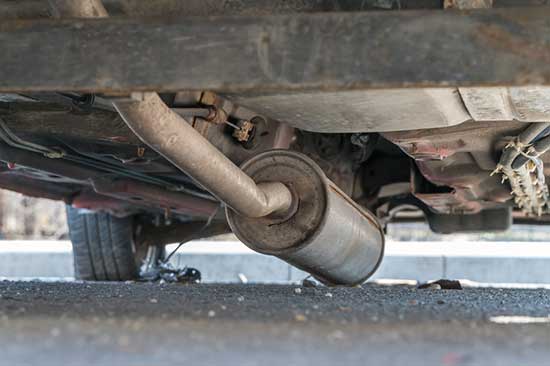A hanging muffler is not just an eyesore; it can also lead to several problems such as increased noise pollution, decreased fuel efficiency, and potential exhaust leaks, which can be dangerous to your health. To avoid these problems, it’s important to fix a hanging muffler as soon as possible.
:max_bytes(150000):strip_icc()/exh-hang2-56a0552f5f9b58eba4afe948.jpg)
Image: www.liveabout.com
1. Safety First: Assessing the Situation
Before you start working on your muffler, park the vehicle on a level surface and allow it to cool down completely. Wear safety glasses and gloves to protect yourself from potential hazards. Use a flashlight to inspect the muffler thoroughly and identify the source of the problem.
2. Identifying the Issue: Common Causes of a Hanging Muffler
Several factors can contribute to a hanging muffler, including:
- Rusted and corroded hangers or bolts
- Broken or detached mounting brackets
- Damaged rubber isolators
- Excessive weight on the muffler system
- Off-road driving or impact with obstacles
3. Gathering Your Tools: What You’ll Need
To fix a hanging muffler effectively, you will require the following tools:
- Wrench set
- Socket set
- Penetrating oil (optional)
- New muffler hangers or bolts (if necessary)
- Jack stands
4. Step-by-Step Guide to Fixing a Hanging Muffler
- Step 1: Elevate the Vehicle
Use jack stands to elevate the vehicle securely, providing you with easy access to the muffler.
- Step 2: Locate the Muffler Hangers
The muffler hangers are usually located on the sides or rear of the muffler. Inspect them for signs of wear, damage, or rust.
- Step 3: Remove the Muffler Hangers
Use the wrench or socket set to remove the bolts or nuts that hold the muffler hangers in place. If the bolts are rusted, apply penetrating oil to loosen them.
- Step 4: Inspect and Replace Hangers (Optional)
If the muffler hangers are damaged or broken, replace them with new ones of the same size and type.
- Step 5: Reattach the Muffler
Carefully align the muffler and reattach it to the mounting brackets using new bolts or nuts. Tighten them securely, but avoid overtightening.
- Step 6: Lower the Vehicle
Once the muffler is secured, slowly lower the vehicle using the jack stands.
5. Expert Tips for a Long-Lasting Fix
- Use high-quality replacement parts for a durable solution.
- Inspect your muffler hanger system regularly to identify any potential issues early on.
- Avoid excessive weight on the muffler by not towing or hauling more than the recommended capacity.
- Consider using a muffler heat shield to protect the muffler from extreme temperatures and corrosion.
6. Conclusion: Maintaining a Healthy Vehicle
A hanging muffler can be a minor inconvenience or a major safety hazard, depending on the severity of the issue. By following these steps carefully and addressing the problem promptly, you can get your vehicle back in top shape and enjoy a smoother, quieter ride for miles to come.

Image: carphrases.com
How To Fix A Hanging Muffler